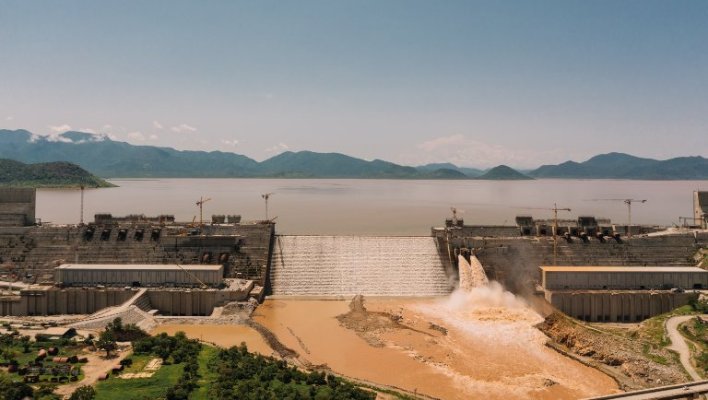Egypt’s Sisi urges Ethiopia to engage in ‘good faith’ to end GERD feud
By Tesfa-alem Tekle
December 10, 2022 (NAIROBI) – Egyptian President Abdel-Fattah al-Sisi renewed calls on Ethiopia to engage in good faith with Egypt and Sudan to reach a legally binding agreement on the controversial Grand Ethiopian Renaissance Dam (GERD).
Al-Sisi made the call at the China-Arab Summit held in Riyadh, Saudi Arabia on December 9. The first meeting of its kind was attended by Chinese President Xi Jinping and the leaders of the Arab countries,
The Egyptian leader called for a binding agreement to be reached between the trios through sincere talks to end a long-standing feud on the Nile dam.
“I would like to, once again, call on the brothers in Ethiopia to engage in good faith with Egypt and Sudan to reach a legally-binding agreement, that secures the rights of development for present and future generations and spares them from threats to their stability, security and safety,” he said.
China has been closely involved in the construction of the GERD.
Beijing provided a $1.2 billion loan USD in 2013 for the related power lines connecting the dam with the towns surrounding the dam and other infrastructures. In addition, China provided another $652 million loan in 2017 for the dam construction.
Further, Chinese companies Gezhouba Group and Voith Hydro Shanghai participated in the construction of the dam.
According to the Egyptian presidency, Chinese President Xi Jinping and al-Sisi held a meeting on the sidelines of the Arab Chinese summit where they discussed bilateral relations, the development of Chinese investments in Egypt and the situation in the Middle East region.
In a related development, al-Sisi discussed the GERD issue with the Chairman of Sudan’s Transitional Sovereignty Council, General Abdel Fattah Al-Burhan in a meeting on the sidelines of the China-Arab Conference.
Al-Burhan, like the Egyptian leader, was keen to say that water was a top priority for the downstream countries and called to reach a binding legal agreement on the GERD.
In his speech at the first China and Arab forum, al-Sisi underscored that the issue of water security affects other Arab countries in addition to his own country.
Al-Sisi said that the issue of water security of the Arab countries should be among the top priorities in the future as part of the China-Arab States Cooperation Forum (CASCF).
“Let me stress, once again, on an issue that I am confident concerns us all, given the constraints and risks it bears and as it amounts to being an existential threat: the issue of Arab Water Security,” al-Sisi said.
“For this, I call for prioritizing this issue in our future cooperation, within “The China-Arab States Cooperation Forum”, and for discussing cooperation methods to address this challenge with various technological, economic and political tools”.
Al-Sisi also called for technical, economic and political cooperation to face the Arab water security challenge.
Downstream countries, Egypt and Sudan consider the Ethiopian mega-dam project dam as a threat to their water supplies. At the same time, Addis Ababa argues the purpose of the dam is to produce power and won’t impact the water flow into the Nile River.
However, Egypt and Sudan still insist on a legally binding agreement with Ethiopia on the overall operation of the dam, to ensure their historic water shares from the Nile.
A series of tripartite negotiations brokered by the African Union and the US government to get Ethiopia, Egypt and Sudan to reach a final and binding agreement didn’t succeed and talks remain stalled for years, with the three parties ultimately failing to reach any agreements on the outstanding issues.
Upon completion, the $ 4.8 billion hydropower project would be the largest in Africa with a capacity of generating 6,400 megawatts of electricity.
(ST)

